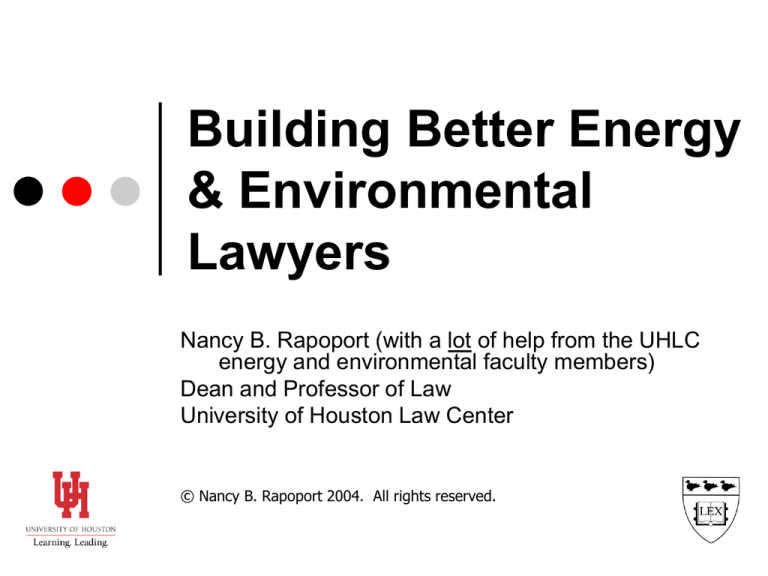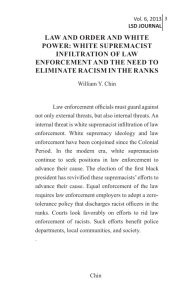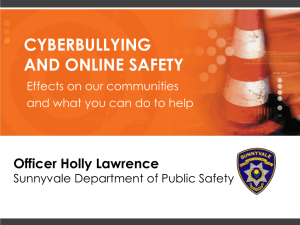
Building Better Energy
& Environmental
Lawyers
Nancy B. Rapoport (with a lot of help from the UHLC
energy and environmental faculty members)
Dean and Professor of Law
University of Houston Law Center
© Nancy B. Rapoport 2004. All rights reserved.
What’s necessary for proper
enforcement of environmental
laws?
Understanding the legal system.
Understanding the business
environment.
Understanding the underlying
science(s).
The air pollution problem in
Houston has three related issues.
Technical complexity.
Scope of the problem – sources.
Problems with legal administration &
enforcement.
Problems with administration and
enforcement are what lawyers and law
professors are most able to address.
2 major types of enforcement:
So-called “command and control”
(use of a particular process or
technology specified by the regulator)
“Market” or “incentive based” (allowing
the regulated entity to determine the
best way to reduce pollution).
Plusses and minuses of each
enforcement mechanism:
“Command and
control”—more
expensive for the
regulated community,
but easier and cheaper
to enforce and
administer.
“Incentive regulation”—much
cheaper for the regulated
community, but difficult to
administer or enforce.
The more complex the
regulated system, the more
likely the dependence on
cooperation or voluntary
mechanisms to enforce
“incentive regulation.”
• Voluntary mechanisms may fail
under certain circumstances,
such as when there is an
incentive to cheat (rewards
from cheating > penalties if
caught).
The Clean Air Act uses both
methods of regulation.
Houston’s ozone is supposed to be brought into
“healthy” levels by state action through the SIP.
But having each state determine the best way to
reduce pollution is an “incentive system” of
enforcement.
The EPA does not have a stringent, credible way to
require state action.
See Victor B. Flatt, A Dirty River Runs Through It
(The Failure of Enforcement in the Clean Water Act),
25 B.C. Envt'l Aff. L. Rev. 1 (1997) (empirical
analysis).
The dilemma:
The Houston ozone problem, which is
incredibly complex, must be subject to
either
extraordinarily expensive monitoring
and enforcement OR
must depend on voluntary actions.
Using either enforcement mechanism
alone is not going to solve our
problems.
What to do?
Recognize legitimacy of the various enforcement
theories.
Provide resources to get correct inventory of
sources (all sources) – work already begun and
spurred by NGOs.
SIP should have systems that are easily enforceable
OR where there is no incentive to cheat.
The Texas Houston SIP is problematic on this front,
BUT
• Texas must WANT to have effective controls and regulation
AND/OR the
• Federal government must DEMAND it.
What this means at UHLC:
Students are taught about theories of how
enforcement and administration works – not just
cases.
Students are taught that they must understand the
issues surrounding the regulated community,
government, and affected citizens.
We train JD candidates (who will someday be
lawyers) and LLM candidates (lawyers who want to
focus on issues of energy and environmental law).
THUS:
Faculty members with backgrounds in
everything from international relations to
antitrust and economics.
Extensive curriculum in energy and
environmental topics.
Institute for Energy, Law and Enterprise—
sponsored research arm of an overall
energy & environmental law program.
Some of the courses that we
teach in these areas:
Administrative law
Biodiversity conservation
Clean Air Act
Coastal zone management
Criminal environmental law
Economics of the energy industry
Energy, Inc.©
Energy law & policy
Energy law & policy seminar
Environmental enforcement and practice
Environmental interagency cooperation
Environmental issues in real estate
transactions
Environmental law land use management
seminar
Environmental law
Environmental liability management
Federal land & resources law and policy
Hazardous waste law
International contracting
International energy transactions
International environmental law
Interagency environmental cooperation
International law introduction to scientific
evidence
Land use
Law of biodiversity conservation
Maritime cargo & collision seminar
Natural resources law
Oil and gas law
Oil and gas taxation
Practice of environmental law
Project financing seminars in environmental
topics
Toxic torts
Water law
New Center for Environmental
Interagency Cooperation.
First of its kind—run by Prof. Victor
Flatt.
Will hear hand-picked class.
Class will hear from federal, state, and
local administrators from all over the
country.
Focus on problem solving regarding
agency procedural enforcement
problems.
Truly interdisciplinary: law, business,
engineering.
Faculty editors working hand-in-hand with
student editors to select and edit articles.
Hosting and publishing symposia: first one
is “Creating Competitive Wholesale Energy
Markets.”
Next steps.
Greater affiliation with UH:
Bauer College of Business.
Cullen College of Engineering.
Greater affiliation with Shell Center for
Sustainability at Rice University.
Greater interaction with companies, agencies,
citizen groups—UHLC as a way to help
research and solve problems (and to train new
lawyers to be problem-solvers as well).
Marcilynn Burke
Assistant Professor of Law.
A.B., International Studies, Univ. of North
Carolina-Chapel Hill.
J.D., Yale Law School.
Courses: Property; Environmental Land
Use Law; Land Use; Natural Resources.
Darren Bush
Assistant Professor of Law.
B.A. (Economics), California State
University, San Bernardino.
Ph.D. (Economics), University of Utah.
J.D., University of Utah.
Courses: Antitrust; Regulated Industries;
Law & Economics; Administrative Law.
Victor Flatt
A.L. O'Quinn Chair in Environmental Law.
B.A., magna cum laude, in Chemistry and
Mathematics at Vanderbilt University.
J.D., Northwestern University School of
Law.
Courses: Environmental Law; Law of
Hazardous Waste; Torts; Administrative
Law.
Michelle Michot
Foss
Executive Director, Institute for Energy,
Law & Enterprise, UHLC.
B.S. in Biology, Geology Minor, Univ. of
Louisiana at Lafayette.
M.S., Mineral Economics, Colorado School
of Mines.
Ph.D., Political Science, Univ. of Houston
(with honors).
Sanford E. Gaines
Law Foundation Professor of Law.
B.A., magna cum laude, Harvard College.
J.D., cum laude, Harvard Law School.
M.A., East Asian Regional Studies,
Harvard University.
Courses: Administrative Law; Coastal
Zone Management; Environmental Law;
International Trade; Torts.
Jacqueline Lang
Weaver
A.A. White Professor of Law.
B.A., Harvard University
Ph.C., University of California at Los
Angeles.
J.D., magna cum laude, University of
Houston.
Courses: Energy Policy; Environmental
Law; Oil and Gas; Property; Public Land
Use; Water Law.
Shameless plugs:
Victor B. Flatt, The Enron Story and
Environmental Policy, 33 Envt’l. L. Rep.
(Envt'l. L. Inst.) 10,485, 10,491 (2003),
reprinted in ENRON: CORPORATE
FIASCOS AND THEIR IMPLICATIONS
(Nancy B. Rapoport & Bala G. Dharan,
eds.) (Foundation Press 2004)
Available on Amazon.com, BN.com and
at fine used bookstores everywhere.
Victor B. Flatt, Spare The Rod and Spoil
The Law: Why The Clean Water Act Has
Never Grown Up, 55 Ala. L. Rev. 595
(2004).




